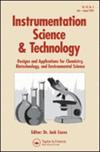基于改进的混合模糊比例积分微分(PID)控制的聚合酶链式反应(PCR)仪器温度控制算法
IF 1.3
4区 工程技术
Q4 CHEMISTRY, ANALYTICAL
引用次数: 1
摘要
摘要本文提出了一种基于改进的混合模糊比例积分微分(PID)控制的自适应聚合酶链式反应(PCR)温度控制算法。该算法在温度快速变化阶段采用模糊控制进行监测,减少了超调量。在恒温阶段,PID控制器的初始参数通过继电器自整定算法在线自动计算。系统的输出通过前馈补偿算法进行预补偿,并通过变域模糊PID算法进行调整,在一定程度上避免了模糊规则的爆炸。实验结果表明,改进的混合模糊PID控制算法的平均升温速率为4.2 °C/s,平均冷却速率为3.2 °C/s。系统稳定在5 s,最大过冲小于1.2 °C,静态误差为±0.1 在各种环境温度下为°C。本文章由计算机程序翻译,如有差异,请以英文原文为准。
Temperature control algorithm for polymerase chain reaction (PCR) instrumentation based upon improved hybrid fuzzy proportional integral derivative (PID) control
Abstract Here is reported an adaptive polymerase chain reaction (PCR) temperature control algorithm based on improved hybrid fuzzy proportional integral derivative (PID) control. The algorithm adopts fuzzy control in the rapid temperature changing stage for monitoring and reduces the overshoot. In the constant temperature stage, the PID controller's initial parameters are automatically calculated online through the relay self-tuning algorithm. The output of the system is pre-compensated by feedforward compensation algorithm, and adjusted by the variable universe fuzzy PID algorithm, which avoids the explosion of fuzzy rules to a certain extent. The experimental results show that the average heating rate of the improved hybrid fuzzy PID control algorithm is 4.2 °C/s, with an average cooling rate is 3.2 °C/s. The system stabilizes within 5 s with a maximum overshoot of less than 1.2 °C and a static error of ± 0.1 °C at various ambient temperatures.
求助全文
通过发布文献求助,成功后即可免费获取论文全文。
去求助
来源期刊

Instrumentation Science & Technology
工程技术-分析化学
CiteScore
3.50
自引率
0.00%
发文量
45
审稿时长
>12 weeks
期刊介绍:
Instrumentation Science & Technology is an internationally acclaimed forum for fast publication of critical, peer reviewed manuscripts dealing with innovative instrument design and applications in chemistry, physics biotechnology and environmental science. Particular attention is given to state-of-the-art developments and their rapid communication to the scientific community.
Emphasis is on modern instrumental concepts, though not exclusively, including detectors, sensors, data acquisition and processing, instrument control, chromatography, electrochemistry, spectroscopy of all types, electrophoresis, radiometry, relaxation methods, thermal analysis, physical property measurements, surface physics, membrane technology, microcomputer design, chip-based processes, and more.
Readership includes everyone who uses instrumental techniques to conduct their research and development. They are chemists (organic, inorganic, physical, analytical, nuclear, quality control) biochemists, biotechnologists, engineers, and physicists in all of the instrumental disciplines mentioned above, in both the laboratory and chemical production environments. The journal is an important resource of instrument design and applications data.
 求助内容:
求助内容: 应助结果提醒方式:
应助结果提醒方式:


